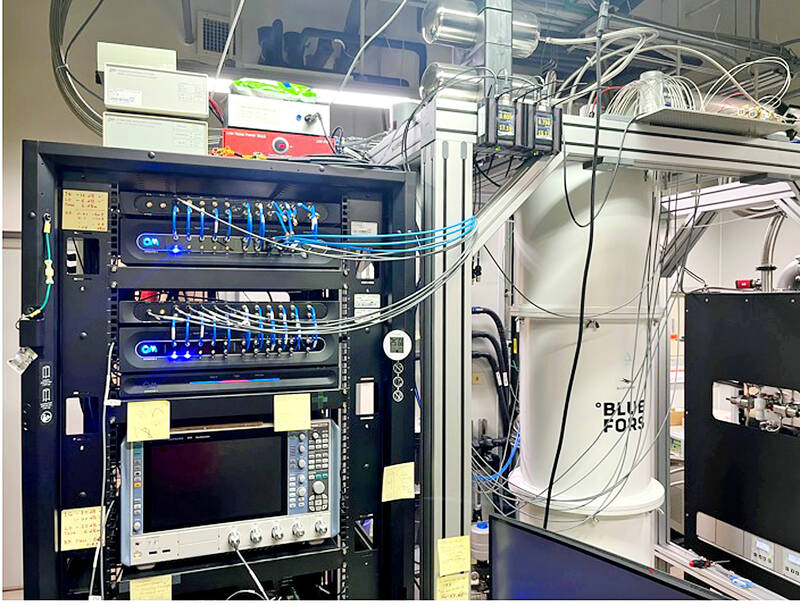Taiwanese researchers have successfully developed 5-quantum-bit (qubit) chips, marking a milestone in the nation’s quest for quantum computer technology, members of Academia Sinica told lawmakers during a Legislative Yuan session on Thursday.
The technology was successfully developed a few months ago and scientists expect to be able to build a quantum computer utilizing the technology before next year, said Lee Chau-hwang (李超煌), executive secretary of the institute’s Central Academic Advisory Committee.
The computer would be put on a cloud system to help the nation’s research institutions and access to the machine would be broadened in the coming years, he said.

Photo courtesy of Chen Chi-tung, Institute of Physics, Academia Sinica
Academia Sinica made the breakthrough in collaboration with Taiwan’s tech sector, foreign experts and the Industrial Technology Research Institute, Lee said, adding that 10 percent of the funding came from overseas sources.
Computers with quantum chips would reach a much higher speed of computation than other supercomputers, which makes quantum computer research a closely guarded secret in many nations, Lee said.
This means Taiwan cannot simply transfer quantum computing technology from another country and must develop the technology itself, he said.
Quantum computing would enable the simulation or analysis of more complex phenomena than before, Lee said.
The technology might allow the making of accurate economic forecasts or predicting traffic bottlenecks, he said.
However, applied quantum computing for everyday problems would not be possible in the short term, Lee said.
The national consortium for quantum computing had initially planned to roll out Taiwan’s first quantum computer in 2025, but the work was hastened in response to fierce international competition, said Luo Meng-fan (羅夢凡), head of the National Science and Technology Council’s Department of Natural Sciences and Sustainable Development.
The initial goal was for the research team to achieve 2-qubit chips by the end of the year, he said.
The next challenge is to develop other technologies such as low-temperature electronics, microwave controllers, and the interface and software that goes into a fully operational quantum computer, he said.
Separately, Luo said a generative artificial intelligence (AI) risk assessment team has been established at Academia Sinica following the closure of the controversial CKIP-LLama-2-7b program, which had utilized China-based data for AI training.

Taiwan has received more than US$70 million in royalties as of the end of last year from developing the F-16V jet as countries worldwide purchase or upgrade to this popular model, government and military officials said on Saturday. Taiwan funded the development of the F-16V jet and ended up the sole investor as other countries withdrew from the program. Now the F-16V is increasingly popular and countries must pay Taiwan a percentage in royalties when they purchase new F-16V aircraft or upgrade older F-16 models. The next five years are expected to be the peak for these royalties, with Taiwan potentially earning

STAY IN YOUR LANE: As the US and Israel attack Iran, the ministry has warned China not to overstep by including Taiwanese citizens in its evacuation orders The Ministry of Foreign Affairs (MOFA) yesterday rebuked a statement by China’s embassy in Israel that it would evacuate Taiwanese holders of Chinese travel documents from Israel amid the latter’s escalating conflict with Iran. Tensions have risen across the Middle East in the wake of US and Israeli airstrikes on Iran beginning Saturday. China subsequently issued an evacuation notice for its citizens. In a news release, the Chinese embassy in Israel said holders of “Taiwan compatriot permits (台胞證)” issued to Taiwanese nationals by Chinese authorities for travel to China — could register for evacuation to Egypt. In Taipei, the ministry yesterday said Taiwan

Taiwan is awaiting official notification from the US regarding the status of the Agreement on Reciprocal Trade (ART) after the US Supreme Court ruled US President Donald Trump's global tariffs unconstitutional. Speaking to reporters before a legislative hearing today, Premier Cho Jung-tai (卓榮泰) said that Taiwan's negotiation team remains focused on ensuring that the bilateral trade deal remains intact despite the legal challenge to Trump's tariff policy. "The US has pledged to notify its trade partners once the subsequent administrative and legal processes are finalized, and that certainly includes Taiwan," Cho said when asked about opposition parties’ doubts that the ART was

If China chose to invade Taiwan tomorrow, it would only have to sever three undersea fiber-optic cable clusters to cause a data blackout, Jason Hsu (許毓仁), a senior fellow at the Hudson Institute and former Chinese Nationalist Party (KMT) legislator, told a US security panel yesterday. In a Taiwan contingency, cable disruption would be one of the earliest preinvasion actions and the signal that escalation had begun, he said, adding that Taiwan’s current cable repair capabilities are insufficient. The US-China Economic and Security Review Commission (USCC) yesterday held a hearing on US-China Competition Under the Sea, with Hsu speaking on